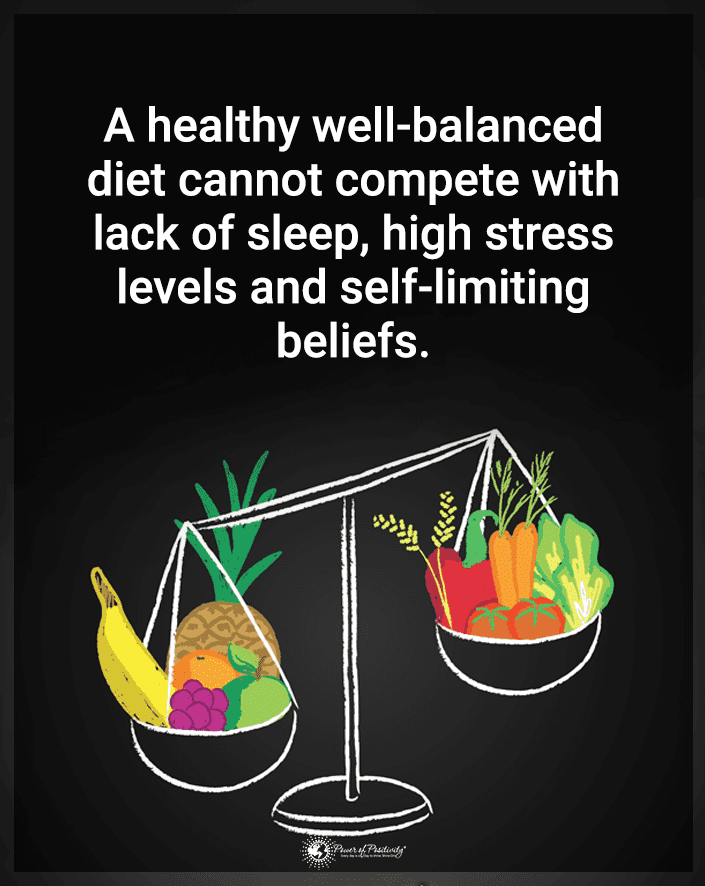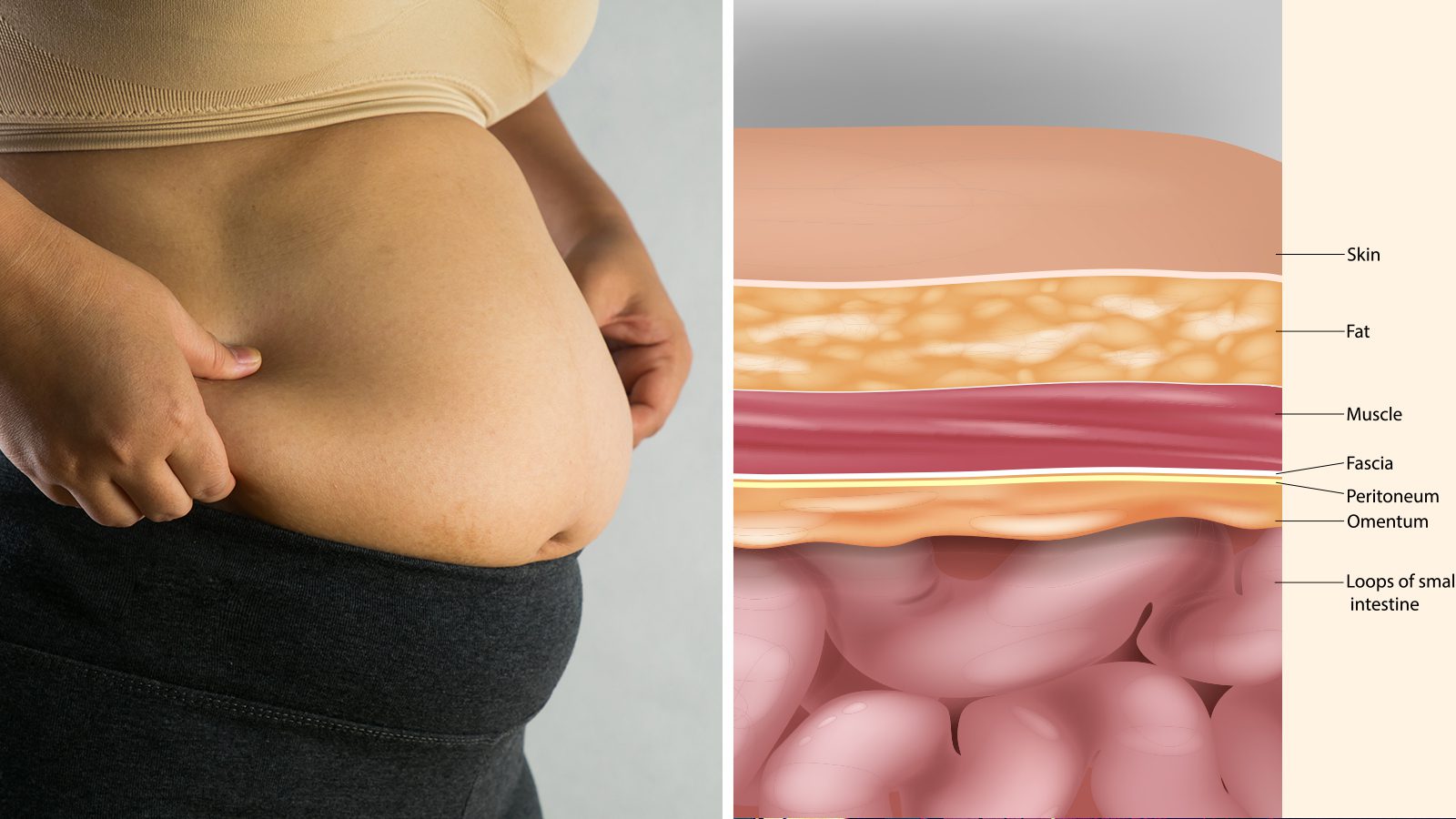Have you been wondering how to lose belly fat–once and for all? Losing tummy fat is a crucial step toward a healthier lifestyle.
Belly fat, specifically visceral fat, is a significant health concern for many individuals. Accumulation of excess belly fat links to many health issues. These include type 2 diabetes, heart disease, and certain types of cancer. Losing belly fat contributes to better health and well-being.
This guide to losing belly fat will explore the different types of belly fat, the science behind belly fat loss, and practical strategies to achieve lasting results. We will also examine the role of diet and lifestyle factors in shedding unwanted belly fat.
Although you don’t have to exercise to lose belly fat, we will also discuss how it contributes to faster and more sustainable weight loss.
By reading this guide, you will gain a thorough understanding of the factors contributing to belly fat accumulation and a comprehensive set of strategies to help you lose belly fat and maintain a healthier lifestyle.
Severe Health Risks That Show Why It’s Crucial to Lose Belly Fat
First, let’s acknowledge that we must all love our bodies as they are. It is a wonderful gift to love yourself, regardless of size. This article does not intend to decrease feelings of self-esteem. Instead, it reviews the science behind how excess fat tissue can reduce general wellness–especially as we age.
That’s not an opinion. Numerous studies prove that excessive belly fat increases the risk of several health problems. Here are the health concerns expressed in multiple scientific studies:
Insulin Resistance and Type 2 Diabetes
Excess belly fat often leads to insulin resistance, a condition in which the body’s cells become less responsive to the hormone insulin. Insulin resistance often precedes the development of type 2 diabetes, a chronic condition marked by high blood sugar levels. So reducing tummy fat can improve insulin sensitivity and lower your risk of developing type 2 diabetes.

High Blood Pressure
Carrying excess belly fat can cause an increased risk of high blood pressure (hypertension.) Hypertension can strain the heart and blood vessels, increasing the likelihood of heart disease, stroke, and other serious health issues. Therefore, losing belly fat can help lower blood pressure, reducing health risks.
Heart Disease
Belly fat has been associated with a higher risk of heart disease, as it can lead to inflammation and plaque buildup in the arteries. This buildup can narrow the arteries, reducing blood flow to the heart and increasing the risk of a heart attack. Reducing belly fat can help decrease inflammation and lower the risk of heart disease.
Stroke
Excess belly fat can increase the odds of a stroke. That event occurs when blood flow to a part of the brain is blocked or when a blood vessel in the brain bursts. Studies reveal that losing belly fat can lower the risk of a stroke by improving blood flow and reducing inflammation.
Certain Types of Cancer
Studies explain that excess belly fat may increase the risk of developing breast and colon cancer. The exact mechanisms behind this association are unclear. But many doctors believe that belly fat may promote the production of hormones and inflammatory substances that can contribute to developing cancerous cells. Losing belly fat may help reduce the risk of these cancers.
Sleep Apnea
Excess belly fat can contribute to the development of sleep apnea, a disorder characterized by brief interruptions in breathing during sleep. These interruptions can lead to poor sleep quality, daytime sleepiness, and an increased risk of heart disease and other health issues. Research shows that sleep apnea symptoms may stem from excessive weight.
Metabolic Syndrome
Metabolic syndrome refers to a cluster of circumstances that may increase the chances of heart disease, stroke, and type 2 diabetes. These conditions include high blood pressure, blood sugar, excess belly fat, and abnormal cholesterol levels. Thus, reducing tummy fat can help improve these conditions and lower the risk of metabolic syndrome.
Poor Mental Health and Reduced Quality of Life
Excess belly fat can lead to poor mental health and reduced quality of life. Carrying excess weight can lead to feelings of low self-esteem, anxiety, and depression. Furthermore, belly fat can interfere with daily activities and reduce overall life satisfaction. Losing belly fat can help improve mental health and overall quality of life by boosting self-confidence and increasing physical mobility.
In light of these risks, a holistic approach to losing tummy fat is essential, focusing on a combination of diet and lifestyle changes. So keep reading to learn the tools and strategies to achieve lasting results in your belly fat loss journey.
To Lose Belly Fat, You Should First Understand the Types of Belly Fat
Before diving into the strategies for losing excess pounds, it’s essential to understand the different types and their implications on your health.
Subcutaneous Fat
Subcutaneous fat is the layer of fat lying directly beneath the skin. It acts as a cushion and provides insulation to regulate body temperature. Having some subcutaneous fat is ordinary and necessary for overall health. However, excessive amounts can lead to an increased risk of health issues.
Visceral Fat
Visceral fat, or intra-abdominal or deep belly fat, surrounds the internal organs inside the abdominal cavity. This tissue is more dangerous than subcutaneous fat due to its association with various health problems, which include type 2 diabetes, cardiovascular disease, and cancer. Losing visceral fat should be a priority for those aiming to reduce belly fat and improve their overall health.
Causes of Fat Accumulation
Understanding the factors that contribute to the accumulation of belly fat can help you take the necessary steps to reduce it. Some common causes of belly fat accumulation include:
Genetics
Genetic factors can play a role in determining where your body stores fat. If your family members carry excess weight in the abdominal area, you may also accumulate tummy fat. However, this doesn’t mean losing tummy fat is impossible; adopting a healthy lifestyle can help you achieve positive results.
Diet
A diet high in sugar, calories, and unhealthy fats can add to the accumulation of tummy fat. Consuming large portions and regularly indulging in processed and fast foods can lead to weight gain, especially in the abdominal area. Therefore, eating whole, nutrient-dense foods and practicing portion control can help prevent and reduce belly fat.
Lifestyle Factors
A sedentary lifestyle often leads to the accumulation of belly fat. Lack of physical activity can slow your metabolism. That makes it harder to burn calories and lose weight. Regular exercise can help increase your metabolism, burn calories, and reduce belly fat.
Hormonal Imbalances
Hormonal imbalances, particularly those related to cortisol (the stress hormone) and insulin, can contribute to the accumulation of belly fat. Chronic stress can lead to heightened cortisol levels, which can cause fat storage in the abdominal area. Additionally, as mentioned earlier, insulin resistance can lead to excess fat storage in the belly.
Age
Our metabolism tends to slow as we age, and muscle mass can decrease. Aging can make it more challenging to maintain or lose weight, leading to the accumulation of belly fat. However, adopting healthy habits, such as regular exercise and a balanced diet, can help counteract these age-related changes and reduce belly fat.
The Science Behind Losing Tummy Fat
Understanding the science behind belly fat loss can help you make more informed diet, exercise, and lifestyle decisions. This section will explore some critical factors influencing losing belly fat.

Calorie Deficit
The fundamental principle behind any weight loss, including belly fat loss, is creating a calorie deficit. It means that you need to burn more calories than you consume through your diet. When the body has a calorie deficit, it uses stored fat as an energy source. That outcome leads to weight loss. Monitoring your daily calorie intake and regular physical activity can help create a calorie deficit and promote belly fat loss.
Macronutrient Balance
While achieving a calorie deficit is essential for weight loss, the balance of macronutrients—carbohydrates, proteins, and fats—also plays a significant role in losing belly fat. A diet rich in lean protein can help support muscle growth and maintenance, promoting a higher metabolism and making it easier to lose weight. Consuming healthy fats can help regulate hormones and support overall health. Finally, emphasizing complex carbohydrates can provide sustained energy and help control blood sugar levels.
Metabolism and Fat Burning
Metabolism is the process occurring when your body converts food into energy. A higher metabolism allows your body to burn calories more efficiently, making weight loss easier and reducing belly fat. Factors influencing your metabolism include age, muscle mass, and physical activity. Engaging in regular exercise, especially strength training, can help boost your metabolism and promote fat burning.
Hormonal Regulation
As mentioned earlier, hormonal imbalances can contribute to the accumulation of belly fat. That’s because cortisol, insulin, and other hormones can influence your body’s ability to store and burn fat. Therefore, managing stress, getting enough sleep, and adopting a balanced diet can help regulate hormone levels and support belly fat loss.
Genetic Factors
While genetics might play a role in determining where your body stores fat, it’s essential to recognize that lifestyle factors can significantly influence your ability to lose belly fat. A healthy lifestyle with regular exercise, a nutritious diet, and stress management can help you reach your goals.
Diet Strategies for Belly Fat Loss
A well-balanced diet is crucial for losing belly fat and maintaining overall health. This section will explore various dietary strategies to help you achieve your tummy fat loss goals.
Importance of a Balanced Diet to Lose Belly Fat and Extra Pounds
A well-balanced diet gives your body the nutrients to function optimally and support weight loss. Consuming various nutrient-dense foods from different food groups can help you achieve a balanced diet, ensuring you get adequate amounts of vitamins, minerals, and other essential nutrients.
Foods to Include to Lose Belly Fat
Focus on including the following types of foods in your diet to promote tummy fat loss and improve your health:
High-fiber Foods
Fiber is crucial to maintain healthy digestion and to keep you full. Thus, it can help prevent overeating.
Foods high in fiber include:
- Fruits
- Vegetables
- Whole grains
- Legumes
- Nuts
These foods help regulate blood sugar levels and reduce hunger, supporting belly fat loss.
Lean Protein Sources
Protein is vital to build and maintain muscle mass. As a result, it can help boost your metabolism and promote fat burning. Lean protein sources include chicken, turkey, fish, tofu, tempeh, legumes, and low-fat dairy products. Consuming adequate protein can help you feel full and support muscle growth, facilitating belly fat loss.
Healthy Fats
Healthy fats, including monounsaturated and polyunsaturated fats, are fundamental for hormone health. These fats occur in avocados, nuts, seeds, olive oil, and fatty fish. Because they increase feeling full, they support tummy fat loss.
Low-glycemic Carbohydrates
Low-glycemic carbohydrates release energy slowly, helping to stabilize blood sugar levels and prevent insulin spikes. Foods with low-glycemic carbohydrates include whole grains, fruits, vegetables, and legumes. Thus, eating foods can help you feel full and energized, supporting weight loss and belly fat reduction.
Foods to Avoid to Lose Belly Fat
To prevent fat accumulation and support weight loss, it’s important to limit or avoid the following types of foods:
High-sugar Foods
Foods high in sugar,–candy, soda, and baked goods–can cause rapid blood sugar and insulin levels spikes, leading to increased fat storage. Limiting your intake of high-sugar foods can help you maintain stable blood sugar levels and prevent belly fat accumulation.
Refined Carbohydrates
Refined carbohydrates, white bread, pasta, and rice, have been stripped of fiber and nutrients. That’s because they are less satiating and more likely to cause blood sugar spikes. Thus, replacing them with whole-grain alternatives can help you feel fuller and support belly fat loss.
Trans Fats
Trans fats in some processed foods and fried items can increase inflammation and contribute to belly fat accumulation. Therefore, limiting your intake of trans fats and focusing on healthier fat sources can support belly fat loss and overall health.
Portion Control and Mindful Eating to Lose Belly Fat
Practicing portion control and mindful eating can help you maintain a calorie deficit and prevent overeating. So focus on eating slowly, savoring every bite. Also, pay close attention to your body’s hunger and fullness cues. As a result of this awareness, you develop a healthier relationship with food and support your belly fat loss efforts.
7-Day Meal Plan to Lose Belly Fat
This 7-day meal plan helps to lose belly fat by incorporating nutritious and balanced meals into your diet. In particular, each day includes breakfast, lunch, dinner, and healthy snack options.
Day #1:
- Breakfast: Greek yogurt with a berry mix, chia seeds, and a drizzle of honey.
- Lunch: Grilled chicken salad. In addition, enjoy some mixed greens, cherry tomatoes, cucumber, avocado, and a lemon-tahini dressing.
- Dinner: Baked salmon with steamed asparagus, quinoa, and a side of lemon-garlic sauce.
- Snack: Baby carrots and hummus.
2:
- Breakfast: Overnight oats with almond milk, chopped nuts, and a dash of cinnamon.
- Lunch: Turkey and avocado wrap with whole-grain tortilla, mixed greens, and Dijon mustard.
- Dinner: Vegetable stir-fry with tofu, brown rice, and a low-sodium soy sauce.
- Snack: A small handful of almonds and a piece of fruit.
3:
- Breakfast: Green smoothie with spinach, banana, almond butter, and almond milk.
- Lunch: Quinoa and black bean salad with bell peppers, corn, cilantro, and lime vinaigrette.
- Dinner: Grilled shrimp skewers with a side of roasted sweet potatoes and steamed broccoli.
- Snack: Greek yogurt with a tablespoon of almond butter.
4:
- Breakfast: Whole-grain toast with mashed avocado, sliced tomato, and a sprinkle of red pepper flakes.
- Lunch: Lentil soup. Additionally, eat a nice mixed greens salad and balsamic vinaigrette.
- Dinner: Baked chicken with roasted Brussels sprouts and a side of wild rice.
- Snack: Apple slices with a tablespoon of natural peanut butter.
5:
- Breakfast: Chia pudding with mixed berries, chopped nuts, and a drizzle of maple syrup.
- Lunch: Chickpea salad with cucumber, red onion, cherry tomatoes, and a lemon-tahini dressing.
- Dinner: Turkey meatballs with zucchini noodles and marinara sauce.
- Snack: Celery sticks and peanut butter.
6:
- Breakfast: Veggie omelet with spinach, bell peppers, onions, and a side of whole-grain toast.
- Lunch: Tuna salad with mixed greens, cucumber, and a side of whole-grain crackers.
- Dinner: Stuffed bell peppers with ground turkey, quinoa, black beans, and tomato sauce.
- Snack: A small handful of mixed nuts and a piece of fruit.
7:
- Breakfast: Fruit and yogurt parfait with granola.
- Lunch: Caprese salad with fresh mozzarella, tomatoes, basil, and a drizzle of balsamic glaze.
- Dinner: Grilled lemon-herb chicken with steamed green beans and a side of brown rice.
- Snack: Cottage cheese with sliced peaches and a sprinkle of cinnamon.
This 7-day meal plan features nutritious foods and balanced meals. In fact, enjoying these tasty dishes will support you on the journey to better health. Feel free to customize the plan to suit your preferences and dietary needs.
7-Day Plant-Based Meal Plan to Lose Belly Fat
Eat vegan or plant-based meals? No problem–here’s your meal plan. Each day includes breakfast, lunch, dinner, and healthy snack options.
Day #1:
- Breakfast: Overnight oats with almond or cashew milk, chia seeds, mixed berries, and a dash of cinnamon
- Lunch: Chickpea salad with fresh mixed greens, cherry tomatoes, cucumber, avocado, and a lemon-tahini dressing
- Dinner: Lentil curry with steamed broccoli, brown rice, and a side of mango chutney
- Snack: Baby carrots and hummus
2:
- Breakfast: Green smoothie with kale, banana, flax seeds, and almond milk
- Lunch: Grilled vegetable wrap with whole-grain tortilla, mixed greens, and avocado
- Dinner: Tofu stir-fry with bell peppers, snap peas, and a low-sodium soy sauce, served over quinoa
- Snack: A small handful of almonds and a piece of fruit
3:
- Breakfast: Chia pudding with mixed berries, chopped nuts, and a drizzle of agave syrup
- Lunch: Quinoa and black bean salad with bell peppers, corn, cilantro, and lime vinaigrette
- Dinner: Stuffed portobello mushrooms with spinach, sun-dried tomatoes, and a side of roasted sweet potatoes
- Snack: Celery sticks with almond butter
4:
- Breakfast: Whole-grain toast with mashed avocado, sliced tomato, and a sprinkle of nutritional yeast
- Lunch: Tomato and vegetable soup with a mixed greens salad and balsamic vinaigrette
- Dinner: Eggplant and chickpea curry served over brown rice
- Snack: Apple slices with a tablespoon of natural peanut butter
5:
- Breakfast: Fruit and soy yogurt parfait with granola
- Lunch: Tempeh and avocado sandwich with whole-grain bread, mixed greens, and Dijon mustard
- Dinner: Lentil and vegetable shepherd’s pie with a side of steamed green beans
- Snack: A small handful of mixed nuts and a piece of fruit
6:
- Breakfast: Veggie scramble with tofu, bell peppers, onions, and a side of whole-grain toast
- Lunch: Mediterranean quinoa salad with cucumber, red onion, cherry tomatoes, kalamata olives, and lemon-herb dressing
- Dinner: Vegetable and bean chili with a side of whole-grain tortilla chips
- Snack: Soy yogurt with a tablespoon of almond butter
7:
- Breakfast: Smoothie bowl with spinach, mixed berries, almond milk, and topped with sliced almonds and chia seeds
- Lunch: Falafel wrap with whole-grain tortilla, mixed greens, cucumber, and a drizzle of tahini sauce
- Dinner: Black bean and vegetable stir-fry with a side of brown rice
- Snack: Rice cakes with avocado and halved cherry tomatoes
This 7-day vegan meal plan incorporates delicious plant-based meals to lose belly fat and boost your health. Of course, you can feel free to change it up to suit your taste.
The Importance of Exercise to Lose Belly Fat
Yes, you can shed excess weight by diet alone. However, you will see faster results and become even healther when you add exercise to your routine. Additionally, you will see the weight and fat loss become sustainable for the long term.
Regular exercise offers numerous health benefits, including increased metabolism, improved cardiovascular health, and reduced risk of chronic diseases. In addition to improving the speed of your tummy fat loss, exercise can help improve your mood, increase energy levels, and enhance your overall quality of life.

Cardiovascular Exercise to Lose Belly Fat
Cardiovascular exercise, aka aerobic exercise, strengthens your heart and arteries. Cardio exercises like walking, jogging, swimming, cycling, and dancing can help burn calories, improve heart health, and increase metabolism. At least 150 minutes of moderate to 75 minutes of vigorous-intensity aerobic weekly exercise can support belly fat loss and overall health.
High-Intensity Interval Training (HIIT)
High-intensity interval training (HIIT) involves alternating between short bursts of intense exercise and periods of lower-intensity recovery. In fact, this training can help you burn more calories in less time. Thus, it becomes a practical option for those with busy schedules. HIIT can increase fat burning, improve cardiovascular health, and support belly fat loss. Indeed, incorporating HIIT workouts into your routine two to three times weekly can help you achieve your goals more quickly.
Strength Training to Lose Belly Fat
Strength training exercises, such as weightlifting, bodyweight, and resistance band workouts, can help build and maintain muscle mass. Increased muscle mass can boost your metabolism. Undoubtedly, this boost makes it easier to lose belly fat. Engaging in strength training exercises at least two or three times weekly can support belly fat loss and improve overall health.
Flexibility and Core Exercises
In addition to cardiovascular exercise and strength training, incorporating flexibility and core exercises into your routine can support belly fat loss and improve overall fitness. Exercises such as yoga, Pilates, and stretching can help improve your posture, increase your range of motion, and strengthen your core muscles. Furthermore, a strong core supports better balance, prevent injuries, and enhance the effectiveness of other exercises.
Tips for Staying Motivated in Your Exercise Routine
Staying motivated to exercise regularly can be challenging. That’s especially true when life gets busy. So the following five tips can help you stay on track and make exercise a consistent part of your belly fat loss journey:
- Set realistic goals: Before you start, establish achievable short-term and long-term goals to help you keep a positive mindset and stay on track.
- Find activities you enjoy: Engaging in genuinely enjoyable exercises can make it easier to stick with your routine.
- Mix it up: Varying your workouts can help prevent boredom and challenge your body.
- Schedule your workouts: Treat your exercise sessions like any other necessary appointment. Of course, that means scheduling them in your calendar. Otherwise, you might forget your workout until it becomes a habit.
- Seek support: Finally, ask friends, family, or a workout buddy to help keep you accountable and encouraged.
Tracking Your Progress
Monitoring your progress and staying motivated throughout your belly fat loss journey is crucial to achieving long-term success. So read on for several methods for tracking your progress, setting realistic goals, and maintaining motivation.
Regularly monitoring your progress can help you stay on track and adjust your diet, exercise, and lifestyle habits as needed. Here are some ways to track your progress:
- Take body measurements: Measuring your waist circumference can provide a more accurate indication of belly fat loss than relying solely on the scale. Then record your measurements every few weeks to track changes over time.
- Use a body composition scale: A body composition scale can provide insight into changes in your body fat, muscle mass, and water weight. For the purpose of fat loss, this data will give you a more comprehensive view of your progress.
- Track your workouts: Keep a log, noting the type of exercise, duration, and intensity. That’s because writing it helps you monitor improvements in your fitness level and make adjustments as needed.
- Keep a food diary: Documenting your daily food intake can help you become more mindful of your daily eating habits and notice areas for improvement.
- Take progress photos: Taking photos of yourself during this journey can serve as a visual reminder of your progress and help keep you motivated.
Setting Realistic Goals
Set short-term goals to help you stay focused and motivated throughout your weight loss journey. Consider the following tips when setting your goals:
- Be specific: Instead of setting a vague goal like ” to lose belly fat,” set a more specific goal, such as “losing 2 inches from my waist circumference in 3 months.”
- Make your goals measurable: Ensure that your goals can be quantified. As a result, you can easily track your progress.
- Set achievable goals: While challenging yourself is essential, setting unrealistic goals often leads to disappointment and decreased motivation. So please focus on attainable goals considering your current fitness level, lifestyle, and time constraints.
- Establish short-term and long-term goals: Short-term goals can help you remain motivated and focus on your long-term objectives. For example, a short-term goal might be to exercise for at least thirty minutes five days per week, while a long-term goal could be to lose a specific amount of tummy fat by a certain date.
Maintaining the Continued Motivation to Lose Belly Fat
Staying motivated is crucial for maintaining your belly fat loss efforts. Undoubtedly, results can take time. So let’s check out these four easy strategies to help you stay motivated:
- Find your “whys”: Determine the underlying reasons for wanting to lose belly fat. Whether it’s to improve your health or boost your confidence, this self-awareness is helpful. Your “why” might also be to enhance your physical appearance. Unless you understand your “whys,” it will be hard to focus on your goals.
- Find support: Surround yourself with supportive (and positive!) friends and family. You might also join a weight loss group to share your experiences, challenges, and successes with others with similar goals.
- Celebrate your achievements: Acknowledge and celebrate your big and small progress. Reward yourself with non-food-related treats. Please consider a spa day or new workout gear. As a result of this treat, you remain motivated and keep your eye on the proverbial ball.
- Stay flexible: Understand that setbacks are a normal part of any weight loss journey. Be prepared to adapt your goals and strategies as needed, and don’t let temporary obstacles derail your overall progress.
Besides tracking your progress, setting realistic goals and maintaining motivation can help you achieve your tummy fat loss objectives. Furthermore, you will enjoy the many health benefits of a leaner, healthier physique.
Managing Stress and Prioritizing Sleep
Reducing stress and ensuring adequate sleep are often overlooked aspects of losing tummy fat. But that’s a mistake, as stress and inadequate sleep can negatively impact your hormones, metabolism, and appetite. As a result, it’s harder to achieve weight loss goals.
Managing Stress
Chronic stress can cause elevated cortisol levels. That can result in appetite spikes and promote fat storage, especially in the abdominal area. Implementing stress management techniques can help balance your hormones and support your weight loss efforts. Some effective stress reduction strategies include:
- Exercise regularly: Regular physical activity can help relieve stress and boost mood. During a workout (and after) the endorphins will make you feel great.
- Practice mindfulness: Incorporate mindfulness practices. Think meditation, deep breathing, or yoga. That’s because these habits reduce stress and increase your well-being.
- Build a support network: Connect with friends, family, or support groups to share your experiences and challenges and receive encouragement.
- Set boundaries: Learn to say no and set limits on your work and personal life. As a result, you maintain a healthier balance and reduce stress.
- Prioritize self-care: Do activities you enjoy and focus on relaxation techniques. For instance, consider a warm bath or reading a book to help alleviate stress.
Prioritizing Sleep
Adequate sleep is essential to maintain a healthy weight and to lose belly fat. That’s because poor sleep can disrupt hormones, increase hunger, and lower metabolism. Subsequently, it is harder to lose weight. Please consider these tips for prioritizing sleep:
- Establish a sleep schedule: Aim for seven to nine hours per night and maintain a consistent bedtime and wake-up time, even on weekends.
- Create a sleep-friendly environment: Keep your bedroom calm, dark, and quiet. Besides that treat yourself–invest in a comfortable mattress and pillows.
- Limit screen time before bed: Avoid electronic devices at least one hour before bedtime, as the blue light emitted can interfere with your sleep quality.
- Develop a bedtime routine: Establish a relaxing pre-sleep routine, such as reading, taking a warm bath, or practicing gentle stretches, to signal your body that it’s time for bed.
- Watch your caffeine and alcohol intake: Finally, limit caffeine consumption to morning and early afternoon and avoid alcohol
In short, these habits help your goal of losing tummy fat.
Staying Consistent and Embracing a Healthy Lifestyle
Because maintaining good health is a lifelong choice, developing better habits for the future is key.
The Importance of Consistency
Consistency is crucial for lasting results when losing belly fat. Maintaining your diet, exercise, and lifestyle habits over time is essential to see progress and prevent weight regain. Once you see progress, here are some tips to stay consistent:
- Set realistic expectations: Understand that losing belly fat takes time and effort, and avoid seeking quick fixes or extreme measures that are unsustainable in the long run.
- Make gradual changes: Implement small, achievable changes to your diet, exercise, and lifestyle habits over time rather than attempting a complete overhaul.
- Establish a routine: Create a daily and weekly routine incorporating healthy eating, regular exercise, stress management, and sleep prioritization. That’s because these habits help you stay consistent with your new habits.
- Monitor your progress: Regularly track your progress to stay accountable and make adjustments to your plan as needed.
Embracing a Healthy Lifestyle
Adopting a healthy lifestyle is the key to long-term success in losing tummy fat and maintaining overall health. Please consider the following tips for embracing a healthy lifestyle:
- Focus on balance and moderation: Avoid restrictive diets or extreme exercise programs. That’s because those behaviors can lead to burnout or disordered eating. Instead, incorporate various nutrient-dense foods and fun physical activities into your daily routine.
- Make it enjoyable: Find ways to make your healthy habits enjoyable. For example, try new recipes, group fitness classes, or explore outdoor activities.
- Incorporate healthy habits into your daily life: Look for opportunities to incorporate healthy habits into your everyday life. So try taking the stairs instead of the elevator, parking farther away from the door, or preparing healthy meals in advance for the week.
- Develop a growth mindset: Setbacks are part of any weight loss journey, not the end of the road. Whenever you can, view these experiences as opportunities for growth and improvement.
As a result, you will learn to achieve your belly fat loss goals by staying consistent and embracing a healthy life. You will also better enjoy the numerous health benefits of a leaner, fitter body is a marathon, not a sprint. So commit to sustainable changes. Also, remember to be patient as your efforts pay off.

Final Thoughts on Implementing These Tips to Lose Belly Fat
Of course, losing tummy fat is not all about your appearance. It is also about your overall health. So adopt a well-rounded approach that includes a balanced diet, regular exercise, stress management, better sleep, and consistency. You will soon crush your weight loss goals and enjoy the numerous health benefits of a lean, healthy body.
Remember to be patient throughout your journey to lose belly fat. That’s because long-term results take time and dedication. Keep your goals in mind. Also, remember your “whys,” and make healthy daily choices to achieve lasting success. So stay on track, embrace a healthy life, and celebrate your progress as you work on a healthier, happier you.

















